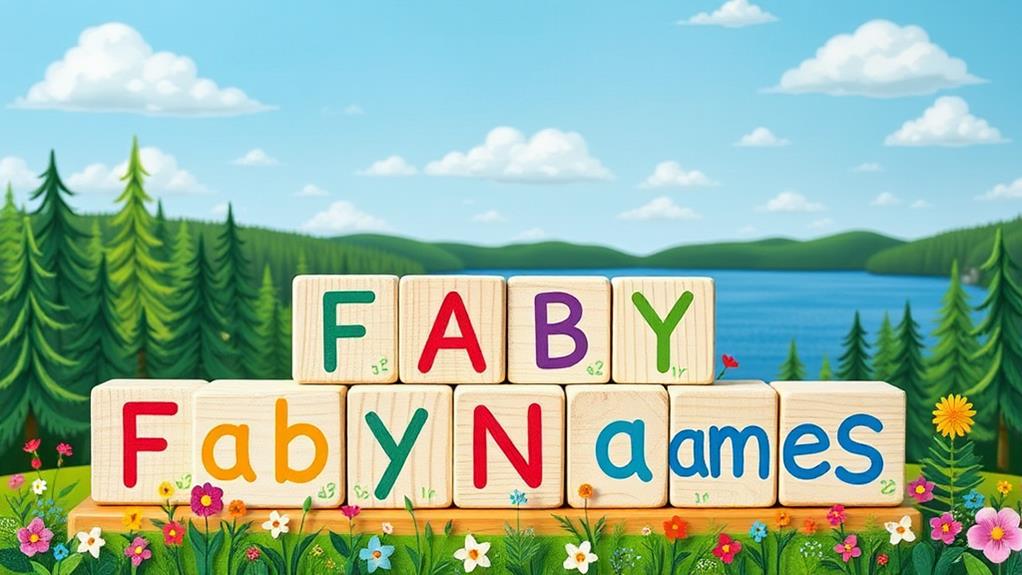When you're searching for a name that stands out and carries a story, European options provide a wealth of inspiration. You might consider names like Soren or Freya, each steeped in cultural significance and charm. As you explore this diverse landscape, you'll find choices that not only reflect your heritage but also possess a unique flair. But the journey doesn't end here; there are many more captivating names waiting to be discovered, each with its own allure and meaning that could resonate with you and your family.
Unique Names From Scandinavia
Exploring the rich tapestry of Scandinavian culture, you'll discover a treasure trove of unique baby names that reflect its heritage. From the enchanting landscapes of Norway to the vibrant traditions of Sweden and Denmark, these names carry deep meanings and stories.
Take "Astrid," for example. It means "divinely beautiful" and has a lovely melodic sound that's hard to resist. Another charming choice is "Soren," which translates to "stern" but has a friendly feel.
For girls, consider "Freya," inspired by the Norse goddess of love and fertility, embodying strength and beauty. You might also find names like "Leif," which means "heir" or "descendant," perfect for a little one destined to carry on family traditions.
Scandinavian names often connect with nature, so "Bjorn," meaning "bear," and "Liv," meaning "life," are both excellent options that celebrate the great outdoors.
These unique names not only stand out but also connect your child to a rich cultural legacy. So, if you're looking for a name that's both distinctive and meaningful, Scandinavian options might be just what you need!
Timeless Choices in Italy
While Scandinavian names bring a unique flair, Italy offers a wealth of timeless choices that capture the heart of its rich history and culture. Italian names often carry beautiful meanings and are deeply rooted in tradition.
For boys, consider names like Leonardo, which means "brave lion," or Alessandro, meaning "defender of mankind." These names not only sound elegant but also reflect strength and courage.
For girls, you might love the name Isabella, which means "devoted to God," or Sofia, meaning "wisdom." Both names are popular in Italy and have a classic charm that never goes out of style. You'll find that these names resonate well beyond Italian borders, making them appealing choices for parents worldwide.
Moreover, many Italian names have historical significance, connecting your child to Italy's rich past. Names like Marco, inspired by the famous explorer, or Giulia, linked to ancient Roman heritage, provide a sense of identity and legacy.
When you choose an Italian name, you're not just picking a label; you're embracing a story, a culture, and a timeless tradition that will carry on for generations. So, why not explore these captivating options?
Charming French Baby Names
When it comes to baby names, French options are undeniably charming and evoke a sense of elegance and sophistication. If you're looking for a name that stands out, French names might just be the perfect choice for your little one.
For girls, names like Amélie and Colette are lovely options that bring a touch of French flair. Amélie means "hardworking," while Colette means "victorious." Both names carry a unique charm that's hard to resist.
You might also consider the name Élodie, which means "foreign riches" and has a melodic sound.
For boys, you can't go wrong with names like Luc or Étienne. Luc means "light," giving it a bright and positive vibe, while Étienne translates to "crown"—a name fit for a little prince.
Another delightful choice is Théo, which means "divine gift."
These names not only sound beautiful, but they also come with meaningful backgrounds. By choosing a French name, you'll give your child a name that's not just unique, but also filled with character and history.
Embrace the charm of French names, and you'll surely find one that resonates with you!
Distinctive German Boy Names
If you're considering a name that carries strength and uniqueness, distinctive German boy names offer plenty of options that stand out. One powerful choice is "Leif," which means "heir" or "descendant," perfect for a little one destined for greatness.
Another option is "Klaus," a traditional name that conveys a sense of wisdom and authority. You might also like "Emil," meaning "rival," which has a friendly yet competitive vibe.
If you want something a bit more adventurous, "Rudolf" can be a fun pick, as it means "famous wolf." For a modern twist, consider "Finn," a name that brings to mind bravery and adventure, inspired by the Germanic folklore.
"Matthias" is another classic choice, which means "gift of God," adding a touch of spirituality to your baby's identity. Lastly, "Sören" offers a unique flair, meaning "stern," perfect for a strong personality.
With these distinctive names, you'll not only celebrate your baby boy's individuality but also connect him to rich German heritage. Choose one that resonates with your family, and watch it become a source of pride as he grows!
Elegant Spanish Names
Elegant Spanish names embody a rich cultural heritage and timeless charm, making them an excellent choice for your baby. These names often have deep meanings and reflect the beauty of the Spanish language. For boys, names like Alejandro, meaning "defender," and Mateo, meaning "gift of God," carry strength and significance.
For girls, consider names such as Isabella, which means "pledged to God," or Valentina, meaning "strong and healthy." Each of these names not only sounds beautiful but also tells a story that you can share with your child as they grow.
Spanish names often have a lyrical quality, making them appealing across various cultures. When you choose a name like Lucia, which means "light," you're giving your child a name that can shine brightly in any context.
As you explore elegant Spanish names, think about how they resonate with your family's values and traditions. Names like Santiago or Carmen can also connect your child to a rich history.
Ultimately, selecting an elegant Spanish name can be a meaningful way to celebrate your baby's identity and heritage.
Rare Names From the UK
Discovering rare names from the UK can be an exciting journey, offering unique options that stand out in a sea of common choices. If you're looking for something different, you might want to consider names like Alaric, which means "ruler of all," or Gwendolyn, a lovely name that conjures images of elegance and strength. Both names have deep roots in British history, making them not only rare but also meaningful.
Another intriguing choice is Ewan, a Scottish name that translates to "young warrior." If you're searching for something more whimsical, consider Pippa, a charming name that means "lover of horses."
Then there's Tamsin, a modern twist on the classic name Thomas, which adds a fresh feel to a timeless choice.
You could also explore the name Orlaith, which means "golden princess" in Irish, or the bold name Thistle, inspired by Scotland's national flower.
Each of these names carries a rich story and a unique flair. By selecting one of these rare names, you're giving your child a distinctive identity that sets them apart and connects them to their heritage.
Enchanting Names From Ireland
While rare names from the UK offer unique options, enchanting names from Ireland hold their own special charm and allure.
Irish names often carry deep meanings and rich histories, making them even more appealing for your little one. For boys, consider names like "Cian," which means "ancient" or "enduring." It's both strong and timeless.
Another wonderful option is "Declan," meaning "full of goodness." This name has a vibrant personality that suits many boys.
For girls, you can't go wrong with "Aoife," pronounced "Ee-fa," which means "radiant." It's a beautiful choice that shines bright with elegance.
Another lovely name is "Siobhan," meaning "God is gracious." This name has a melodic sound and can truly stand out.
Exotic Eastern European Names
Often overlooked, exotic Eastern European names bring a unique flair that can set your child apart. These names often carry rich meanings and histories, making them not just beautiful but also meaningful.
For boys, consider names like "Luka," which means "bringer of light," or "Marek," a form of Mark that has a strong and noble sound. For girls, names like "Zara," meaning "princess," and "Anya," which means "grace," can be both lovely and inspiring.
You might also explore names like "Viktor," representing victory, or "Darya," which translates to "sea." Each name has a story and a cultural background that adds depth to your child's identity.
Choosing an exotic Eastern European name can connect your child to a broader heritage, sparking curiosity about their roots.
Moreover, these names are often easy to pronounce, making them accessible to friends and family. You'll find that they can be both striking and approachable, perfect for any modern child.
Sweet Names From Greece
Greece offers a treasure trove of sweet names that beautifully capture the charm and warmth of its culture. You'll find that many Greek names have lovely meanings and can make a perfect choice for your little one.
For girls, consider "Elena," which means "bright, shining light." It's not just beautiful but has a lovely glow to it! Another charming option is "Callia," meaning "beautiful." With a name like that, your daughter will carry a sense of grace.
For boys, you might like "Theo," derived from "Theodore," meaning "gift of God." This name has a timeless quality that feels both modern and classic. Another sweet choice is "Niko," which means "victory." It's short, strong, and full of character.
Exploring these names gives you a glimpse into Greek culture and history. Each name carries a story, and choosing one connects your child to a rich heritage.
Unique Names From Portugal
Portugal boasts a variety of unique names that reflect its rich culture and history. If you're looking for something special, you might consider names like Afonso for boys, which means "noble" and has royal roots. For girls, the name Beatriz is charming; it translates to "she who brings happiness." Both names carry a sense of heritage and strength.
Another interesting option is the name Gonçalo, which has been popular for centuries. It means "battle" and evokes a sense of bravery and adventure. For girls, you could choose the name Inês, meaning "pure," which has a lovely, timeless feel.
If you want something a bit more modern, you might like the name Tiago, a stylish twist on the classic James, perfect for a trendy boy. For a girl, consider the name Lúcia; it's bright and cheerful, meaning "light."
These names not only sound beautiful, but they also tell stories of the past. By choosing a unique Portuguese name, you're celebrating a rich tradition while giving your child a distinctive identity.
Captivating Names From the Netherlands
What makes Dutch names so captivating? The Netherlands has a rich cultural heritage that shines through its unique names. Many Dutch names have deep meanings or historical significance, making them special choices for your little one.
For boys, names like "Jasper" and "Thijs" stand out. Jasper, meaning "treasurer," is both classic and trendy, while Thijs, a short form of Matthijs, has a friendly and approachable vibe.
For girls, consider names like "Lieke" or "Sanne." Lieke, meaning "bringer of joy," is sweet and cheerful, perfect for a lively personality. Sanne, with its meaning rooted in "lily," evokes a sense of beauty and grace.
You might also be drawn to names that reflect nature, such as "Storm" for boys or "Iris" for girls. Storm conveys strength and energy, while Iris connects to the lovely flower.
Choosing a Dutch name lets you celebrate your child's individuality, offering a touch of cultural richness. So, whether you prefer something traditional or modern, the Netherlands provides captivating options that can make your baby's name stand out beautifully!
Lovely Names From Belgium
Belgium offers a delightful array of names that reflect its diverse culture and rich history. When you consider names for your little one, you might come across some beautiful Belgian options.
For boys, names like "Jasper" and "Luca" are popular choices. Jasper, meaning "treasurer," has a charming ring to it, while Luca, meaning "bringer of light," carries a bright, positive vibe.
For girls, you can't overlook names like "Elise" and "Aline." Elise, a classic name, is elegant and timeless, often associated with joy and happiness. Aline, meaning "noble," has a lovely sound and a touch of sophistication.
Belgium's multicultural background also introduces unique options, such as "Thijs" for boys. Thijs is a short form of Matthijs, meaning "gift of God," and it's quite trendy.
You might also consider "Amélie," which isn't only stylish but also evokes a sense of warmth and charm.
Traditional Names From Austria
Exploring traditional names from Austria reveals a rich tapestry of history and culture. These names often reflect the country's deep roots in the arts, music, and folklore.
For boys, names like Maximilian, meaning "the greatest," and Lukas, meaning "bringer of light," are popular choices. They carry a sense of strength and character, making them timeless options for your little one.
For girls, you might consider names such as Anna, which means "grace," and Sophia, meaning "wisdom." These names have been cherished for generations and evoke a sense of elegance and beauty. They're versatile, fitting for both classic and modern lifestyles.
Many traditional Austrian names also draw inspiration from historical figures, local saints, or notable places. This connection to the past can add a special significance to your child's name.
Plus, choosing a name with cultural depth can enrich their identity and spark curiosity about their heritage.
Unique Names From Switzerland
For girls, "Elin" is a charming choice, meaning "light" or "torch." It's both simple and elegant, embodying a sense of warmth.
Another lovely option is "Luzia," derived from "light," which captures the spirit of Swiss summers.
Don't forget about the playful name "Fritzi," a cheerful and friendly name for a girl, meaning "peaceful ruler."
These names give a nod to Switzerland's natural beauty and cultural heritage, making them unique yet meaningful choices.
By selecting a name from this stunning country, you're not only embracing its history but also giving your child a name that stands out in a crowd.
Playful Names From Finland
Dive into the whimsical world of Finnish names, where playful options abound for your little one. Finnish names often reflect nature, folklore, and light-heartedness, making them truly unique.
For boys, consider the name "Aapo," which means "father of many." It's not just charming; it has a friendly vibe that's sure to bring smiles. Another delightful choice is "Kimi," which means "elf." This name captures a sense of magic and wonder, perfect for your little dreamer.
For girls, "Lumi" stands out, meaning "snow." It embodies the beauty of winter and is both sweet and simple. You might also love "Sini," which translates to "blue." This name reflects the serene colors of the sky, adding a touch of beauty to your child's identity.
These names not only sound lovely but also carry deep meanings. They invite curiosity and connection to Finnish culture, making them perfect for parents seeking something special.
Strong Names From Hungary
Hungarian names carry a sense of strength and heritage that can truly resonate with your family's values. When considering names, you might find that many Hungarian options have deep meanings and historical significance.
For boys, names like "Bálint" symbolize bravery, while "Gábor" translates to "God is my strength." These names not only sound powerful but also connect your child to a rich cultural past.
For girls, "Zsófia" stands out, meaning "wisdom." It's a name that embodies intelligence and resilience. Another beautiful option is "Eszter," which signifies "star." This name not only brings a sense of brightness but also carries a timeless elegance.
Choosing a strong name from Hungary can provide your child with a unique identity, one that stands out while still honoring tradition. Plus, these names often come with interesting stories and roots that you can share with your child as they grow.
Nature-Inspired Names From Europe
Embracing the beauty of nature can inspire some of the most enchanting baby names from Europe. If you're searching for a name that reflects the wonders of the natural world, you'll find plenty of options that are both unique and meaningful.
For boys, consider the name "Bram," which means "bramble" in Dutch, evoking images of lush, green hedges. "Ronan," an Irish name meaning "little seal," can connect your child to the serene waters of the coast.
For girls, "Lila" is a lovely choice, derived from the French word for "lilac," symbolizing beauty and grace. Another beautiful option is "Soleil," which means "sun" in French, bringing warmth and brightness to your little one's life.
You might also like "Eira," a Welsh name meaning "snow," perfect for a winter baby.
These nature-inspired names not only celebrate the environment but also carry deep meanings that can inspire your child throughout their life. So, when you think about naming your baby, let the stunning landscapes of Europe guide your choices, creating a connection between your little one and the beauty of nature.
Mythical Names From Europe
Mythology is rich with captivating stories and characters, making mythical names from Europe a fantastic choice for your baby's identity. These names not only sound enchanting, but they also carry deep meanings and histories.
For boys, consider "Odin," the chief god in Norse mythology, symbolizing wisdom and knowledge. Alternatively, "Perseus," a hero from Greek tales, represents bravery and strength as he slayed the Gorgon.
For girls, "Freya," the Norse goddess of love and beauty, brings a sense of charm and grace to your little one's name. Another lovely option is "Elowen," derived from Cornish mythology, meaning "elm tree," connecting your child to nature and folklore.
Choosing a mythical name can spark curiosity about its origins and stories, opening doors to fascinating conversations. Plus, these names stand out in a crowd, giving your child a unique identity.
Whether you want something bold, like "Thor," or more gentle, like "Luna," there's a mythical name that'll resonate with you. So, dive into the rich tapestry of European mythology and find a name that'll inspire your child's journey through life!
Vintage Names With Heritage
Vintage names with heritage often evoke a sense of timeless elegance and connection to the past. These names carry stories and traditions from generations, making them special choices for your little one. Think of names like Eleanor, which means "shining light," or Arthur, rooted in legends of nobility and strength.
Using vintage names can also honor your family's history. You might find inspiration from your grandparents or even great-grandparents. Names such as Beatrice or Frederick not only sound charming but also remind you of family legacy.
Many vintage names have unique spellings or variations, so you can personalize them. For instance, you might choose the name Henrietta instead of the more common Harriet, giving it a fresh twist while respecting tradition.
When considering these names, think about how they'll fit into modern life. A name like Matilda, once considered old-fashioned, is now trendy and cute.
Modern European Names
As you explore names for your child, modern European names offer a fresh and contemporary twist while still reflecting cultural richness. These names often draw inspiration from various languages and traditions, making them unique choices for your little one.
For boys, names like Luca, which means "bringer of light" in Italian, or Finn, rooted in Irish culture, have gained popularity for their stylish yet meaningful qualities.
For girls, names such as Elara, a name with Greek origins that conveys brightness, or Sienna, inspired by the beautiful Italian city, stand out with their charm and elegance. You might also consider names like Freya, which is derived from Norse mythology, adding a touch of strength and beauty.
Modern European names not only sound trendy but also connect your child to a broader cultural heritage. They can inspire curiosity and spark conversations about your family's roots.
Short and Sweet Names
Embracing simplicity, short and sweet names are perfect for parents seeking elegance and ease. These names typically consist of one or two syllables, making them easy to say and remember. You'll find that a name like "Luca" or "Mila" not only sounds delightful but also carries a charming, modern flair.
In many European cultures, short names often have deep roots and can reflect a rich history while still being trendy. Names like "Max," "Eva," or "Leo" are popular choices that blend simplicity with style. They're versatile, working well in various languages and cultures, which can make your child's name feel universal.
Another advantage of short names is their adaptability. You can easily pair them with longer middle or last names, creating a balanced and harmonious full name.
Plus, these names often come with fun nicknames. For instance, "Sam" can be short for "Samuel," giving you options as your child grows.
Names With Historical Significance
Names with historical significance often carry stories and meanings that resonate through generations. When you choose a name rooted in history, you're not just picking a label; you're embracing a legacy.
For boys, names like Alexander evoke the great conqueror Alexander the Great, symbolizing strength and leadership. If you're considering a girl's name, Eleanor, inspired by Eleanor of Aquitaine, signifies intelligence and resilience.
These names have stood the test of time, often linked to remarkable figures in history. Choosing one of these names can inspire your child to embody the qualities associated with their namesake. It's a wonderful way to instill a sense of pride and connection to the past.
Additionally, many historical names have fascinating meanings. For instance, the name Hugo means "mind" or "intellect," reflecting a rich heritage of thinkers and leaders.
When you select a name with historical significance, you're giving your child a piece of history to carry with them. It's a meaningful choice that can spark curiosity about their heritage and the stories behind their name, encouraging them to explore and connect with the past.
Unique Combinations of Names
Creating unique combinations of names can add a personal touch and reflect your family's heritage or values. By blending names, you can create something truly special for your child. For example, consider combining classic names like "Liam" and "Emma" to form "Liamma" or "Emmian." These combinations not only sound beautiful but also tell a story about your family's roots.
You might also want to think about using names from different cultures. If you have a French name like "Julien" and a German name like "Frieda," you could create "Julieda." This not only honors both cultures but gives your child a unique identity.
Another approach is to mix names from family members. If Grandma's name is "Marie" and Grandpa's is "Thomas," you could combine them to make "Maromas." This way, you keep family connections alive while giving your child a fresh name.
Ultimately, the goal is to create a name that resonates with you and your family. So, grab a notebook, brainstorm, and don't be afraid to get creative! You never know, the perfect name combination might be just a few ideas away.
Popular Yet Unique Choices
Finding the right balance between popularity and uniqueness can be an exciting challenge. You want a name that stands out but doesn't feel too outlandish. Luckily, there are plenty of names from Europe that fit this description perfectly.
For boys, names like Finn and Theo have gained popularity, yet they still maintain a unique flair. Finn, with its Irish roots, means "fair" or "white," while Theo, a shortened form of Theodore, means "gift of God." Both are trendy but not overly common.
For girls, consider names like Elara and Mira. Elara, of Greek origin, refers to one of Zeus's lovers and embodies a sense of mystery and beauty. Mira, which means "wonder" in Latin and "peace" in Slavic languages, is both charming and distinctive.
These names strike a balance, allowing your child to have a sense of individuality while still being relatable to their peers.
Tips for Choosing a Name
When choosing a name, it's essential to consider how it sounds and feels in everyday life. You'll want a name that rolls off the tongue easily, both for you and your child. Think about how it might be pronounced by teachers, friends, and family. It should be something that feels right and makes you smile.
Next, consider the meaning behind the name. Many European names have rich histories and beautiful meanings that can add depth to your choice. Researching the origins can help you find a name that resonates with your values or cultural background.
Don't forget to think about nicknames, as many names lend themselves to creative short forms. Ensure you like the potential nicknames that might arise.
Also, try saying the name out loud with your last name. How does it sound together? You want it to flow well, so it doesn't feel awkward.






























































































